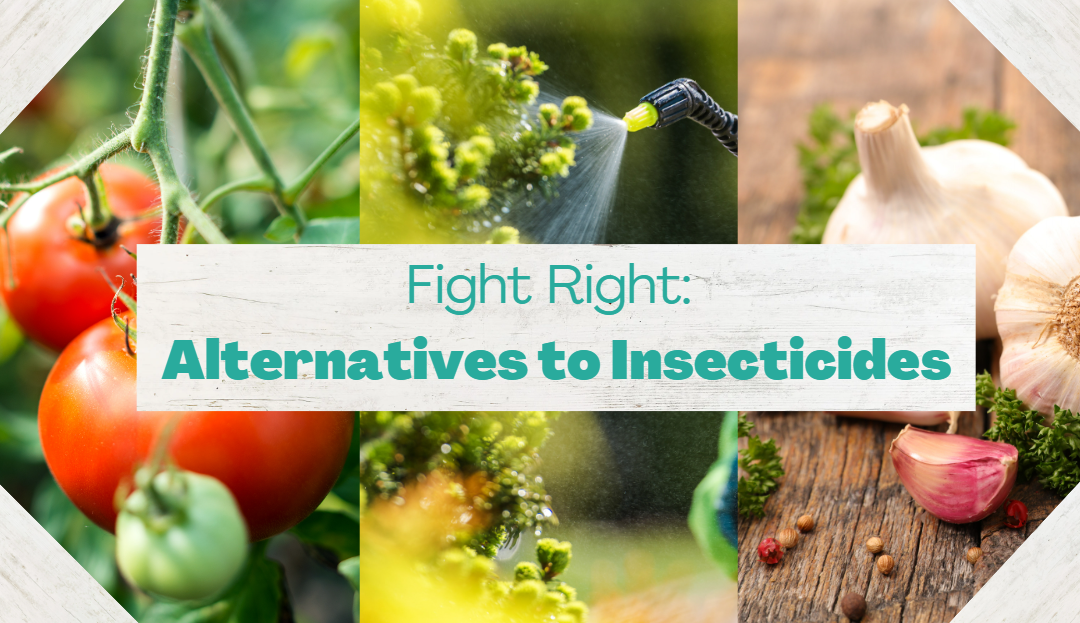Written By: Emily Shen
Edited By: Colleen Haridass
Designed By: Emily Shen
Published By: Maryam Khan
Insecticides have a long track record of being harmful to the environment and causing a chain reaction of damage to all sorts of organisms. Refraining their use is encouraged and can help keep our planet healthy and balanced. However, pests of all sorts that come sneaking their way to your garden can be bothersome and difficult to contend without them. Fortunately, there are many natural and eco-friendly alternatives to insecticides and pesticides that will keep those nosy visitors away.
Getting rid of infected plants or wilting leaves will prevent the spread of disease to healthier plants. Keeping your garden clean and tidy such as disposing of fallen fruit can help prevent insects from crawling your way. Planting a variety of plants and rotating what plants you grow not only makes it difficult for pests to destroy your entire garden, it also helps replenish the nutrients in the soil. This keeps your plants healthy and strong.
Diatomaceous earth is a dirt-like substance that is made up of broken up fossils of diatoms (a type of microalgae). It contains a sharp texture for certain insects like ants and helps keep them away. Layer down some diatomaceous earth around your plants, replenish it as needed, and let it work its magic. The sharp texture of scattered broken eggshells can also help deal with soft-bodied slugs and snails.
Growing plants that attract beneficial insects can help your garden as well. Insects like ladybugs, praying mantises, and lacewings feed on harmful insects like aphids, mites, as well as their eggs and larvae. Dill, Queen Anne’s Lace, dandelion, golden marguerite, fern-leaf yarrow and coriander are just a few plants that help attract beneficial insects. Plants with strong odours such as mint and chives can help repel certain pests as well such as aphids.
Sprays made out of tomato leaves are as effective as they are poisonous to many insects. Soak chopped tomato leaves in water overnight and after it is strained and the leaves are removed. It can be sprayed on your plants. Garlic is also fatal to many insects. By combining garlic with oil, some water, as well as a bit of dish soap, this concoction is effective at warding away insects as well as clinging to your plants. However, make sure not to spray your plants with garlic oil during a very sunny day as the oils may burn the plant. Hot pepper sauce diluted with water is also a great repellant as the capsaicin that resides in peppers are both irritating for humans and insects.
Whether it’s pesky aphids and ants or irksome slugs and snails, fear not when armed with these natural alternatives to insecticides. Saving your garden is great, but saving your garden and the environment is even better!
References
Author, G. (2022, February 17). Heal the Earth with Diatomaceous “Dirt”. Retrieved from https://greenerideal.com/guides/0315-heal-earth-diatomaceous-dirt/
Diatomaceous earth. (2022, September 05). Retrieved from https://en.wikipedia.org/wiki/Diatomaceous_earth
Hoffman, F. (2019, May 11). Plants That Attract Beneficial Insects. Retrieved from https://www.permaculturenews.org/2014/10/04/plants-attract-beneficial-insects/
Staff, G. I. (2022, August 12). How to Get Rid of Garden Pests Without Chemicals. Retrieved from https://greenerideal.com/guides/get-rid-garden-pests-without-chemicals/
Vanderlinden, C. (2012, January 11). 15 Homemade Organic Gardening Sprays That Actually Work. Retrieved from https://home.howstuffworks.com/green-living/homemade-organic-gardening-sprays.htm

